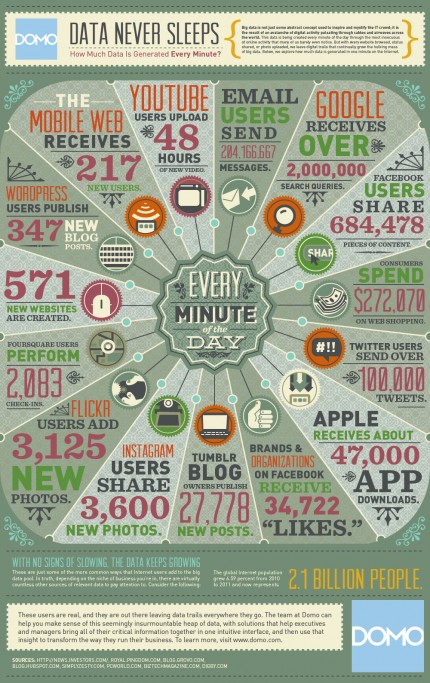Digital Literacy:
Evaluate
In our digital world, finding information is not the issue. As Josh James argues, "Data never sleeps. Every minute massive amounts of it are being generated from every phone, website and application across the Internet." For example, James' reports that 571 new websites are created each minute, that 48 hours of new YouTube videos are uploaded each minute, and that Facebook users share 684,478 each minute. Digital technologies allow us better opportunities to evaluate the credibility and quality of what we read. Resources for Researchers includes a tutorial on "Evaluating Research," which includes criteria for evaluating resources.
In addition to standard techniques for evaluating the results of our investigations, digitized materials provide special considerations. For example, as Heather Ball explains, there are both limitations and ethical implications for consulting material that has been digitized. First, there are distinct advantages to using the tangible object over its digitized counterpart. Second, it is sometimes difficult to determine whether or not a digitized image has been altered. This is not to say that we should avoid using Google Books or other digitized collections. But digital literacy requires that we understand limitations as well as benefits.
Another problem encountered using digital resources is fake images and fake data; sometimes deliberately created; sometimes innocently forwarded by individuals who have been duped. Artificial intelligence has been used to identify fake images on Twitter and cites such as Snopes.com specialize in debunking "urban legends, folklore, myths, rumors, and misinformation." However, researchers need to carefully investigate before they share information through social media, in research papers, or as part of a digital project.
A final concern is confirmation bias; a tendency to believe that with which we agree. As a regular Facebook user with friends from a variety of ages, religions, and political perspectives, I have noticed that these individuals appear to primarily read only those sources that support their worldviews. Also, many memes are uncritically shared even when the contents are illogical or untrue. Recognizing that we are all subject to confirmation bias, we need to be especially careful when evaluating information that supports our point-of-view.
